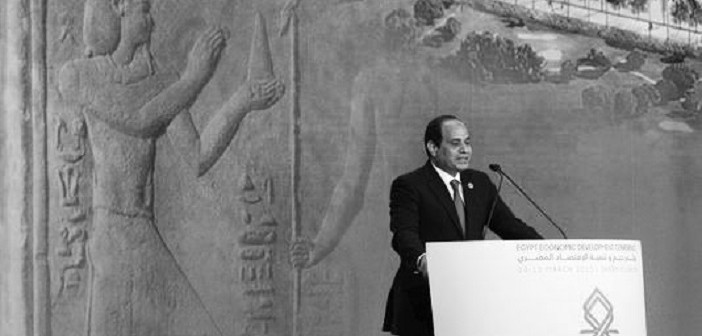Egypt´s President al-Sisi is frequently blamed in Western media for his suppression of all kinds of Islamists, including the Muslim Brotherhood, and his heavy-handed response to the jihadist insurgency in his country. Since the beginning of the year there have been more than 320 terrorist attacks in Egypt resulting in at least 251 non-militants killed. Keeping this statistics and the difficult socio-economic situation of the country in mind, the question ishow the deadly terrorist threat for Egypt can be countered.
The Geostrategic Importance of Egypt
Egypt is one of the lead nations in the Arab World. The headquarters of the League of Arab States is located in Cairo. It has with 86.9 million by far the most numerous population of any Arab country (the Arab League States are 410 millions). The 167 km Suez Canal is one of the world’s most important waterways, providing the shortest route for vessels traveling between the Persian Gulf / Southern Asia and Europe. In 2014 16,744 ships with 784,191,000 cargo tons passed through the canal – about 8% of the global trade. Egypt is Israel’s most powerful neighbor with the largest military of all Arab nations. The relations between the two countries are keys for the Palestine peace process and the stability of the region.
Importance to Europe – Interests
Europe has lots of vital strategic interests in connection with Egypt. The country’s stability is not only important to the stability of the whole region, it is also crucial to prevent a mass migration to Europe. Keeping the sheer numbers of the population in mind, a scenario like in Syria or in Libya with subsequent waves of emigration would be a nightmare for the European Union and the whole continent.
On the economic side a blockade of the Suez Canal would have a very negative impact on Europe’s economy.
In a wider context, Egypt has been a moderating factor in Arab foreign policy for decades. Its influence is important for the numerous intra-Arabic conflicts and for the relations between Sunni and Shia Muslims.
The Enemy
There are several dozens of jihadist groups active in Libya, but Jamaat Ansar Bayt al-Maqdis (Group of Partisans of Jerusalem, ABM) is by far the most dangerous and most active one. It announced its existence “officially” on 24 July 2012 claiming responsibility for 13 attacks on the Trans-Sinai pipeline since February 2011. The campaign of ABM intensified following the ousting of President Morsi. Occasionally the group expressed its solidarity with the Muslim Brotherhood led protests against the new government. The most important leaders of the group are probably Ahmed Salam Mabruk, a long-term Islamic extremist with some ties to AQ, and Abu Osama al-Masri, who pledged obedience to Abu Bakr al-Baghdadi, the “caliph” of the Islamic State.
ABM adheres to a Salafi jihadi ideology, but keeps its activities in the local area. The primary objective of the group is presumably the establishment of a fundamentalist Islamic state in Egypt, while the liberation of Jerusalem serves as long-term goal. The group does not show any interest to participate in the political process. As several other Islamic extremist groups, it considers the end of Morsi´s presidency as a proof that the democratic process is a failure. Any process which gives the power to make laws without directly referring to the Sharia is already non acceptable.
ABM has no known links to any other state, but coordinates with Gaza-based Palestinian terrorist groups like the “Popular Resistance Committee” and the “Mujahidin Shura Council in the Environs of Jerusalem”, organizations in the orbit of the Islamic State. It is very likely that there are also contacts with Salafi jihadi groups in Libya.
The main operational focus of ABM remains in North Sinai and along the border to Israel, although attacks are also mounted in the southern part of the peninsula, the Nile Delta, along the Suez Canal, in Cairo and in the western part of the country close to the Libyan border.
The core of the group consists of members of Bedouin tribes of the Sinai. As the activities were expanded into other parts of the country, non-Bedouin Egyptians were recruited to support and conduct attacks. Currently it numbers probably up to 1,000 members.
Since the very beginning ABM has targeted Israel with rockets, cross border armed attacks and occasional other ground operations. Main targets in Egypt are security forces the economy (in particular oil and gas pipelines, energy supply, other infrastructure, and tourism), and government officials.
Preferred tactics applied in Egypt include the use of remote controlled and time-fused explosive devices, suicide bombers, small arms ambushes, assassinations, kidnapping, and coordinated larger-scale attacks. The group has also a very limited number of serviceable MANPADS (Man-portable air defense system) available, probably smuggled over the border from Libya.
The funding of the group is unclear, although it is obvious that ransom payment contributes in part.
ABM´s pledge of allegiance to the Islamic State in November 2014 will facilitate incorporation of other Islamic extremists and the spread of violence. Future targets will probably also include in line with the strategy of the Islamic State Western assets and individuals.
A further increase of the attacks of the group outside of the Sinai can be expected. The main focus will shift from security forces to the economy. ABM will remain the most active and most deadly extremist group in Egypt.
Egypt’s terrorist groups use the Islamists strongholds and ungoverned spaces in neighboring Libya as a training ground, supply zone and assembly area for their attacks in the Western Desert and the river Nile valley. It is quite frustrating for the security forces to deal with an enemy who has its bases out of the own reach.
The strategy of the Islamic extremists in Egypt is obviously to weaken in a first phase the security forces in specific areas and the economy of the country. All the three top sources of foreign currency, Suez Canal shipping, hydrocarbons, and tourism have been the target of terrorist attacks since the army toppled President Morsi in July 2013. Over-reactions of the security forces are provoked by intent to alienate them from the population.
The worsening security and socioeconomic situation should prepare the ground for mass protests and a public uprising to finally overthrow the government.
Egypt’s response
President al-Sisi is well aware that prosperity and welfare are crucial for the stability of his country. Social riots and civil unrest could lead to a lasting destabilization even without terrorism.
Several major economic projects shall give the economy the necessary boost to recover.
The recently concluded Suez Canal expansion will shorten the average time for a passage by about 10 hours, as waiting times can be minimized. According to Egypt’s government the revenues will increase from about $5.5 billion in 2014 to more than $14 billion over the next decade. Realization of this expectation will depend on the future development of world economy. But keeping the expected impact of the recent Iran nuclear agreement on the country’s foreign trade with Europe in mind, Egypt has some good reasons to be optimistic.
A Suez Canal Economic Zone should attract foreign companies by exploiting the convenient location in the middle between European and Asian markets cutting down the costs for transporting the products.
Egypt’s energy self-sufficiency will increase significantly with the recent discovery of “a world class supergiant” natural gas deposit 120 miles off the coast. After it has reached full production capacity it will be alone able to satisfy Egypt’s natural gas demands for decades. Together with the current operational fields this will also boost gas exports substantially.
A new administrative and economic capital with a population of 5 million shall be built eastward of Cairo until 2022. The calculated costs amount to $45 billion, but funding is for the time being unclear.
Huge investments are planned for the improvement of the poorly maintained infrastructure, including the power grid. A nuclear power plant project with a desalination facility was agreed upon during the visit of Russia’s President Putin to Cairo in February 2015.
The fight against environmental degradation will be emphasized. This is important to maintain the vital agricultural sector, which provides jobs for 29% of the labor force.
Al-Sisi is aware that a certain amount of security is precondition for an economic upswing. The military response to the insurgency and all security related measures need toshape the environment, but remain only part of the efforts of the government. All security related efforts are needed to be seen in context with this, although unfortunately the police and the military as well as the judiciary sometimes overshoot.
… and what can we do?
The West can have an important role in stabilizing Egypt. Most important are foreign investments in the economy. The funds already available from the Gulf States won’t be enough for a recovery.
In the long-term al-Sisi will need to make peace with moderate Islamists to achieve a lasting stability. Europe needs to encourage a reach-out by the government.
The stabilization of Libya is crucial for drying out the insurgency in Egypt. As long as the terrorists can use this country as a safe haven, they cannot be defeated. For this reason and for the sake of its own interests, Europe needs to get significantly more engaged in Libya.
Egypt’s new Pharaoh is more or less on the right path, but he needs considerablemore international support to succeed, not only from the Gulf States. The more room for maneuver he has, the easier it will be for him to accept compromises with honestly moderate Islamists.
Europe needs to realize that a western style market-democracy is not (yet?) the best solution for a country like Egypt.




1 Comment
An Interresting Analysis about Egypt need for Stabilization. For sure However the analysis remains atomistic as captured in its overfocus on the economy , and the occultation of the most important aspect in Egypt’s stabilization: Native democratic governance in the Islamic Progressive style . Sofor sure, Not onmy Europe, but the world needs to realize that the Arab Spring was in a pig part a political statement against Western style market-democracy